| Listing 1 - 10 of 13 | << page >> |
Sort by
|
Book
ISBN: 9782843102783 2843102782 2843103878 Year: 2016 Publisher: Grenoble : UGA Éditions,
Abstract | Keywords | Export | Availability | Bookmark
 Loading...
Loading...Choose an application
- Reference Manager
- EndNote
- RefWorks (Direct export to RefWorks)
Que le christianisme ait perdu sa vocation à évangéliser l'ensemble de la planète n'est pas, ou n'est plus, au centre d'un débat passionné, comme à l'époque de Vieyra. Par contre, les potentialités dialectiques d'une telle hypothèse chez un brillant sermonnaire comme l'illustre jésuite, et plus encore la quête foisonnante qu'il entreprend pour cela dans l'imaginaire biblique donnent des passages d'une fulgurante beauté, qu'il eût été dommage de ne pas transcrire dans la langue de Bossuet. Au demeurant, la prédestination divine, qui s'applique alors au « petit peuple » portugais, donne à l'ensemble une dimension identitaire, telle qu'on la voit ressurgir à l'orée de notre propre siècle.
271.5 <469> --- 271.5 <469> Jezuïeten--Portugal --- Jezuïeten--Portugal --- Religion --- Literature --- aspects religieux --- Église catholique --- histoire --- jésuite --- message prophétique --- Vieyra António
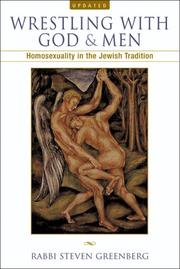
ISBN: 1282269321 9786612269325 0299190935 9780299190934 0299190943 9780299190941 Year: 2004 Publisher: Madison, Wis. University of Wisconsin Press
Abstract | Keywords | Export | Availability | Bookmark
 Loading...
Loading...Choose an application
- Reference Manager
- EndNote
- RefWorks (Direct export to RefWorks)
Male homosexuality --- Orthodox Judaism. --- Homosexuality in the Bible. --- Jewish sects --- Ex-Orthodox Jews --- Religious aspects --- Judaism. --- Homosexualité masculine --- Judaïsme orthodoxe --- Homosexualité dans la Bible --- Judaism --- Aspects religieux --- Judaïsme
Book

ISSN: 02235099 ISBN: 9782728313068 2728313067 2728313075 Year: 2021 Volume: 547 Publisher: Rome : Publications de l’École française de Rome,
Abstract | Keywords | Export | Availability | Bookmark
 Loading...
Loading...Choose an application
- Reference Manager
- EndNote
- RefWorks (Direct export to RefWorks)
Dans l’Occident médiéval, à partir du XIIe siècle, la question des biens mal acquis rencontre celle de la restitution, cet acte par lequel le bon chrétien s’engage à rendre les richesses acquises illicitement pour être en accord avec l’enseignement de l’Église et avec sa conscience. Les male ablata ont souvent pour origine - mais non exclusivement - des relations de crédit abusives, usuraires, que la restitution permet précisément de réparer en indemnisant, directement ou indirectement, les débiteurs lésés. Du XIIe au XVe siècle, des sources variées documentent ce mouvement de restitutio male ablatorum, depuis les dispositions pontificales, les questions théologiques et les commentaires des canonistes jusqu’aux testaments et donations inter vivos, en passant par des promesses de restitution ou des actes judiciaires. Pour interroger cette documentation, il importe avant tout de se dégager d’un a priori historiographique très répandu qui en réduit la portée à une simple moralisation hypocrite, pour satisfaire l’Église, des pratiques économiques des marchands médiévaux. Les textes réunis dans ce volume s’appuient sur des dossiers documentaires inédits et apportent une première réponse aux questions historiques posées par la restitution des biens mal acquis : quels en furent les acteurs, les bénéficiaires et les intermédiaires, quelles en furent les modalités, la chronologie et la place dans les sociétés médiévales ?
Restitution --- Usury --- Credit --- Usury laws (Canon law) --- History --- Sources --- Moral and ethical aspects --- Sources. --- Economic history --- History. --- History . --- Restitution, droit --- --Usure --- --Crédit --- --Aspects religieux --- --Christianisme --- --Occident --- --Moyen âge, --- Restitution - Europe - History - Sources --- Usury - Europe - History - Sources --- Credit - Europe - History - Sources --- Credit - Moral and ethical aspects - Europe - History - Sources --- Usury laws (Canon law) - Sources --- Usure --- Crédit --- Aspects religieux --- Christianisme --- Moyen âge, 476-1492 --- Occident --- Moyen Âge --- restitution --- usure --- morale économique --- Europe. --- Council of Europe countries --- Eastern Hemisphere --- Eurasia
Book

ISSN: 12552364 ISBN: 9782753559042 275355904X 2753588732 Year: 2022 Publisher: Rennes : Presses universitaires de Rennes,
Abstract | Keywords | Export | Availability | Bookmark
 Loading...
Loading...Choose an application
- Reference Manager
- EndNote
- RefWorks (Direct export to RefWorks)
Si l’histoire traditionnelle de l’hérésie au Moyen Âge s’est longtemps confondue avec celle des exclus de la société, l’approche récente se focalise davantage sur les diverses autorités qui, au coeur du pouvoir, élaborèrent la norme religieuse : l’hérésie n’existe que parce que l’orthodoxie en a d’abord décidé. Il reste que, loin de se présenter comme une essence immuable, elle s’impose tout au long du Moyen Âge comme un concept et une qualification d’une très grande plasticité. L’extension progressive du domaine de l’hérésie à de nombreuses formes de dissidence finit par lui assurer le statut d’un crime englobant. Cette enquête collective repose sur la conviction que c’est encore en se situant aux marges de l’hérésie, au contact d’activités répréhensibles voisines, telles que l’usure, la sorcellerie ou encore la rébellion politique, que l’on peut le mieux saisir les principes et les mécanismes de la fabrique de l’hérésie.
History of Europe --- Christian church history --- anno 500-1499 --- Christentum. --- Christian heresies --- Christian heresies. --- Heresy --- Heresy. --- Häresie. --- Hérésie. --- Hérésies chrétiennes --- Mittelalter. --- Early church. --- History --- Middle Ages. --- History. --- 30-1500. --- Geschichte 500-1500. --- Europe --- Europe. --- Church history --- Heresie --- Normes sociales --- Social norms --- Dissidents (religion) --- Dissenters, Religious --- Aspect religieux --- Religous aspects --- Politique publique --- Government policy --- Hérésie chrétienne --- --Norme sociale --- --Aspects religieux --- --Dissident, religion --- --Politique publique --- --Moyen âge, --- Journée d’etude --- --Rennes --- --actes --- --Hérésie chrétienne --- --Hérésies chrétiennes --- --Christentum. --- --Christian heresies --- Norme sociale --- Aspects religieux --- Dissident, religion --- Moyen âge, 476-1492 --- Rennes --- Histoire médiévale --- Histoire religieuse --- Hérésies chrétiennes
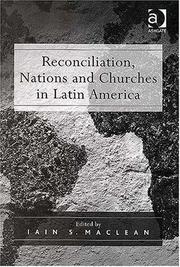
ISBN: 0754650308 1138264717 1409477231 1315603950 131707047X 9786611098407 128109840X 0754683664 Year: 2006 Publisher: Taylor & Francis
Abstract | Keywords | Export | Availability | Bookmark
 Loading...
Loading...Choose an application
- Reference Manager
- EndNote
- RefWorks (Direct export to RefWorks)
This book examines the recent phenomenon in Latin America of national Truth and Reconciliation commissions. Few studies have examined the role of Churches or religion in political processes that proclaim valued theological terms as their agenda: truth, forgiveness, and reconciliation. The contributors here question the role of religion, specifically of established Churches. The impact of such reconciliation commissions on Indigenous Native Americans is also examined, as is the role of women and how both commissions and Churches or religions were challenged by their experiences.
Reconciliation --- Christianity and politics --- Church and state --- Christianity and culture --- Réconciliation --- Christianisme et politique --- Eglise et Etat --- Christianisme et civilisation --- Religious aspects --- Christianity. --- Political aspects --- Aspects religieux --- Christianisme --- Aspect politique --- Réconciliation --- Christianity --- Church and politics --- Politics and Christianity --- Politics and the church --- Political science --- truth, commission, human, rights, memoria, del, silencio, orbis, books, enrique
Book
ISBN: 1501716824 9781501716829 9781501716812 1501716816 9781501716805 1501716808 Year: 2018 Publisher: Ithaca, NY
Abstract | Keywords | Export | Availability | Bookmark
 Loading...
Loading...Choose an application
- Reference Manager
- EndNote
- RefWorks (Direct export to RefWorks)
Burning Bodies interrogates the ideas that the authors of historical and theological texts in the medieval West associated with the burning alive of Christian heretics. Michael Barbezat traces these instances from the eleventh century until the advent of the internal crusades of the thirteenth century, depicting the exclusionary fires of hell and judicial execution, the purifying fire of post-mortem purgation, and the unifying fire of God's love that medieval authors used to describe processes of social inclusion and exclusion.Burning Bodies analyses how the accounts of burning heretics alive referenced, affirmed, and elaborated upon wider discourses of community and eschatology. Descriptions of burning supposed heretics alive were profoundly related to ideas of a redemptive Christian community based upon a divine, unifying love, and medieval understandings of what these burnings could have meant to contemporaries cannot be fully appreciated outside of this discourse of communal love. For them, human communities were bodies on fire. Medieval theologians and academics often described the corporate identity of the Christian world as a body joined together by the love of God. This love was like a fire, melting individuals together into one whole. Those who did not spiritually burn with God's love were destined to burn literally in the fires of Hell or Purgatory, and the fires of execution were often described as an earthly extension of these fires. Through this analysis, Barbezat demonstrates how presentations of heresy, and to some extent actual responses to perceived heretics, were shaped by long-standing images of biblical commentary and exegesis. He finds that this imagery is more than a literary curiosity; it is, in fact, a formative historical agent.
Christian heretics --- Fire --- Flesh (Theology) --- Human body --- Body, Human --- Human beings --- Body image --- Human anatomy --- Human physiology --- Mind and body --- Theology, Doctrinal --- Flesh and spirit antithesis (Pauline doctrine) --- Heresies and heretics --- Heretics, Christian --- Heretics --- History. --- Religious aspects --- Christianity. --- History of doctrines --- Christianity --- Europe --- Church history --- Chemistry --- Combustion --- Heat --- Religious aspects&delete& --- History --- Corps humain --- --Aspects religieux --- --Christianisme --- --Histoire des doctrines --- --Moyen âge, --- Chair humaine --- --Théologie --- --Feu --- --Hérétique --- --Peine --- --Religious aspects --- Heresy, eschatology, medieval authors, processes of social inclusion and exclusion, the burning alive of Christian heretics, internal crusades of the thirteenth century, the love of God. --- Human body - Religious aspects - Christianity - History of doctrines - Middle Ages, 600-1500 --- Flesh (Theology) - History of doctrines - Middle Ages, 600-1500 --- Fire - Religious aspects - Christianity --- Christian heretics - Europe - History --- Aspects religieux --- Christianisme --- Histoire des doctrines --- Moyen âge, 476-1492 --- Théologie --- Feu --- Hérétique --- Peine --- Europe - Church history - 600-1500
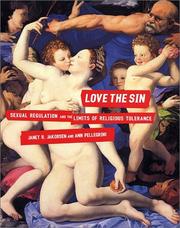
ISBN: 0814743250 1429414405 9781429414401 9780814742648 0814742645 0814742645 9780814743256 Year: 2003 Publisher: New York, NY
Abstract | Keywords | Export | Availability | Bookmark
 Loading...
Loading...Choose an application
- Reference Manager
- EndNote
- RefWorks (Direct export to RefWorks)
Sex. Religion. There is no denying that these two subjects are among the most provocative in American public life. Even the constitutional principle of church-state separation seems to give way when it comes to sex: the Supreme Court draws on theology as readily as it draws on case law when rendering decisions that touch on sexuality. In this compelling and carefully argued study, Janet R. Jakobsen and Ann Pellegrini examine this powerful and disturbing connection as they explore the reasons why secular institutions habitually use religion to regulate sexual life. From state legislatures to the halls of Congress and the Supreme Court, from daily newspapers to popular magazines and television talk shows, Jakobsen and Pellegrini illustrate the intensity of America's obsession with sex in the name of values and the dangers it poses to some of our most basic freedoms. Using a wide range of case studies, Love the Sin offers an insightful critique of the ways in which sexuality in general and homosexuality in particular are discussed and debated in the public arena. Additionally, the book sets forth constructive alternatives that highlight the vital links between sexual and religious freedom and expose the hazards of using religion as a justification for regulating sexuality. A timely, necessary, and refreshing contribution to the many debates surrounding religion, morality, and sex, Love the Sin boldly dreams an America that lives up to its promise of freedom and justice for all.
Gay rights --- Homosexuality --- Same-sex attraction --- Sexual orientation --- Bisexuality --- Government policy --- United States. --- Religious aspects --- Christianity. --- godsdienst (religie, religieuze aspecten) --- seksualiteit en samenleving --- Verenigde Staten --- 241.64*32 --- Gay and lesbian rights --- Gay men --- Gays --- Lesbian rights --- Lesbians --- Rights of gays --- Rights of lesbians --- Civil rights --- Religious aspects&delete& --- Christianity --- Government policy&delete& --- United States --- religion (aspects religieux) --- sexualité et société --- Etats Unis --- Theologische ethiek: homosexualiteit --- Legal status, laws, etc. --- between. --- links. --- morality. --- religion. --- sex. --- study. --- timely. --- troubling. --- seksualiteit en religie --- homoseksualiteit
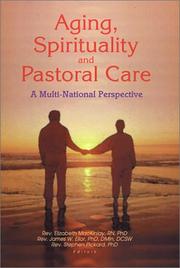
ISBN: 0203049047 1136402527 9781136402524 0789016680 9780789016683 0789016699 9780789016690 9780203049044 9781136402593 1136402594 9781136402661 1136402667 Year: 2001 Publisher: New York Haworth Pastoral Press
Abstract | Keywords | Export | Availability | Bookmark
 Loading...
Loading...Choose an application
- Reference Manager
- EndNote
- RefWorks (Direct export to RefWorks)
How can you foster spiritual growth in older people?This multidisciplinary work re-examines issues of aging with dignity and spiritual meaning. Aging, Spirituality, and Pastoral Care: A Multi-National Perspective brings together chaplains, pastors, counselors, and health care practitioners in all walks of gerontology from around the world to present a fully rounded picture of the spiritual needs and potentialities of this fast-growing population. It also includes a study of the spiritual awareness of nurses working in six different nursing homes, as well as a model for a parish nursi
Church work with older people. --- Older people --- Church work with the aged --- Religious life. --- Church work with older people --- Australië --- bejaarde --- christendom --- godsdienst (religie, religieuze aspecten) --- ouderdom --- pastorale zorg --- spiritualiteit --- theologische ethiek --- Verenigde Staten --- 253:362.1 --- 253:362.1 Pastoraal voor zieken, ouderen en stervenden --- Pastoraal voor zieken, ouderen en stervenden --- Religious life --- Australy --- personne agée --- christianisme --- religion (aspects religieux) --- vieillesse --- soin pastoral --- spiritualité --- éthique théologique --- Etats Unis
Book
ISBN: 9780226514796 022651479X 9780226514826 022651482X Year: 2017 Publisher: Chicago London
Abstract | Keywords | Export | Availability | Bookmark
 Loading...
Loading...Choose an application
- Reference Manager
- EndNote
- RefWorks (Direct export to RefWorks)
The Low Countries were at the heart of innovation in Europe in the fifteenth century. Throughout this period, the flourishing cultures of the Low Countries were also wrestling with time itself. 'The Fullness of Time' explores that struggle, and the changing conceptions of temporality that it represented and embodied showing how they continue to influence historical narratives about the emergence of modernity today. 'The Fullness of Time' asks how the passage of time in the Low Countries was ordered by the rhythms of human action, from the musical life of a cathedral to the measurement of time by clocks and calendars, the work habits of a guildsman to the devotional practices of the laity and religious orders. Through a series of transdisciplinary case studies, it explores the multiple ways that objects, texts and music might themselves be said to engage with, imply, and unsettle time, shaping and forming the lives of the inhabitants of the fifteenth-century Low Countries. Champion reframes the ways historians have traditionally told the history of time, allowing us for the first time to understand the rich and varied interplay of temporalities in the period.
Time --- Time perception --- Civilization, Medieval. --- Fifteenth century. --- Civilization. --- Social aspects --- Religious aspects --- Christianity. --- Social aspects. --- To 1500. --- Benelux countries --- Benelux countries. --- History --- 15th century --- Civilization, Medieval --- Medieval civilization --- Middle Ages --- Time (Theology) --- Chronometry, Mental --- Duration, Intuition of --- Intuition of duration --- Mental chronometry --- Time, Cognition of --- Time estimation --- Hours (Time) --- Civilization --- Perception --- Low countries --- Fifteenth century --- Religious aspects&delete& --- Christianity --- 930.24 --- 930.24 Historische chronologie --- Historische chronologie --- Chronology --- History of the Low Countries --- anno 1400-1499 --- Christian religion --- Renaissance --- Chivalry --- Geodetic astronomy --- Nautical astronomy --- Horology --- Orientation (Psychology) --- Temporalité --- --Temps --- --Aspects sociaux --- --Belgique --- --Pays-Bas --- --Pays-Bas bourguignons --- --Aspects religieux --- --Moyen âge-XIXe s., --- XVe s., --- Civilization [Medieval ] --- To 1500 --- Time - Social aspects - Benelux countries --- Time perception - Social aspects - Benelux countries --- Time - Religious aspects - Christianity --- Temps --- Aspects sociaux --- Aspects religieux --- Moyen âge-XIXe s., 600-1900 --- XVe s., 1401-1500 --- Belgique --- Pays-Bas --- Pays-Bas bourguignons --- Benelux countries - Civilization --- Benelux countries - History - To 1500 --- Low Countries. --- calendar. --- chronology. --- fifteenth century. --- liturgy. --- medieval. --- music. --- temporality. --- time. --- vision. --- muziekgeschiedenis
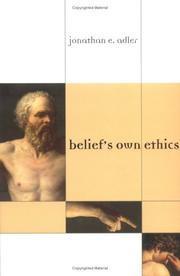
ISBN: 0262011921 0262511940 9780585436150 0262266822 0585436150 0262261375 9780262266826 9780585436159 0262240440 9780262240444 9780262511940 9780262011921 0262286602 0585480885 9780262261371 9780262286602 9780585480886 Year: 2003 Publisher: Cambridge, Mass. MIT Press
Abstract | Keywords | Export | Availability | Bookmark
 Loading...
Loading...Choose an application
- Reference Manager
- EndNote
- RefWorks (Direct export to RefWorks)
The fundamental question of the ethics of belief is "What ought one to believe?" According to the traditional view of evidentialism, the strength of one's beliefs should be proportionate to the evidence. Conventional ways of defending and challenging evidentialism rely on the idea that what one ought to believe is a matter of what it is rational, prudent, ethical, or personally fulfilling to believe. Common to all these approaches is that they look outside of belief itself to determine what one ought to believe. In this book Jonathan Adler offers a strengthened version of evidentialism, arguing that the ethics of belief should be rooted in the concept of belief--that evidentialism is belief's own ethics. A key observation is that it is not merely that one ought not, but that one cannot, believe, for example, that the number of stars is even. The "cannot" represents a conceptual barrier, not just an inability. Therefore belief in defiance of one's evidence (or evidentialism) is impossible. Adler addresses such questions as irrational beliefs, reasonableness, control over beliefs, and whether justifying beliefs requires a foundation. Although he treats the ethics of belief as a central topic in epistemology, his ideas also bear on rationality, argument and pragmatics, philosophy of religion, ethics, and social cognitive psychology.
Theory of knowledge --- filosofie (filosofische aspecten) --- godsdienst (religie, religieuze aspecten) --- philosophie (aspects philosophiques) --- religion (aspects religieux) --- Belief and doubt. --- Evidence. --- Belief and doubt --- Evidence --- Philosophy --- Philosophy & Religion --- Speculative Philosophy --- Proof --- Conviction --- Doubt --- Faith --- Logic --- Truth --- Consciousness --- Credulity --- Emotions --- Knowledge, Theory of --- Psychology --- Religion --- Will --- Agnosticism --- Rationalism --- Skepticism --- PHILOSOPHY/General --- Corpus callosum. --- Sensorimotor integration. --- Cerebral hemispheres. --- Alexia. --- Corpus Callosum --- Brain --- Cognitive Science. --- Dominance, Cerebral. --- Functional Laterality --- physiology. --- Laterality. --- Medische psychologie --- Physiology. --- Neuropsychologie. --- Alexia --- Cerebral hemispheres --- Corpus callosum --- Sensorimotor integration --- Integration, Sensorimotor --- Intersensory integration --- Perceptual-motor integration --- Sensimotor integration --- Sensory integration --- Sensory-motor integration --- Perceptual-motor processes --- Sensory integration dysfunction --- Telencephalon --- Brain hemispheres --- Split brain --- Acquired dyslexia --- Dyslexia, Acquired --- Word-blindness --- Aphasia --- Reading disability --- Dyslexia --- Diseases --- Corps calleux --- Intégration sensorimotrice --- Cerveau --- Alexie --- Hémisphères --- NEUROSCIENCE/General
| Listing 1 - 10 of 13 | << page >> |
Sort by
|

 Search
Search Feedback
Feedback About UniCat
About UniCat  Help
Help News
News